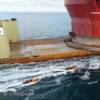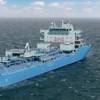Study Prompts Investments in LNG as Marine Fuel
A new study by the consulting group SEA/LNG reveals “a strong investment case” for LNG as a marine fuel in the container shipping market.
The study was commissioned from the independent simulation and analytics company Opsiana in order to provide shipowners and operators in analyzing investment opportunities, said a press release from SEA\LNG.
Peter Keller, Chairman, SEA\LNG, said: “We commissioned this study from independent simulation and analytics expert Opsiana to support shipowners and operators in analysing their investment opportunities in an informed way, while simultaneously providing deeper analysis of the assumptions that go into the 2020 decision process.”
He continued: “The study unequivocally shows that for this vessel type, on this trade route, LNG as a marine fuel delivers the best return on investment on a net present value (NPV) basis over a conservative 10-year horizon, with fast payback periods ranging from one to two years.”
The results of the study, which analyses the case of a newbuild 14,000 TEU container vessel operating on an Asia-US West Coast (USWC) liner routing and compares six fuel pricing scenarios, challenge commonly held assumptions in relation to the economic performance of LNG bunkers.
The results are even more compelling given the investment scenarios are compiled and compared based upon on a route with very little voyage time (8%) in Emission Control Areas (ECAs). LNG is also proven to be the best investment across a broad spectrum of business climates from strong freight markets with elevated vessel operating speeds to weak freight markets where slow steaming is employed.
The study further indicates that LNG provides a greater ROI than alternative compliance solutions, including the installation of Exhaust Gas Cleaning Systems (EGCS), or scrubbers, across 5 out of 6 of the fuel scenarios explored. It also reveals a diminishing CAPEX hurdle, competitive energy costs, the stability of LNG pricing, and the realistic cost of scrubbers.
Moreover, these higher returns were achieved without factoring in the significant additional benefits gained by choosing LNG as a more environmentally-friendly marine fuel; a choice that increasingly possesses a currency value as major global brands and beneficial cargo owners demand cleaner logistics chains.
The analysis is supported by SEA\LNG’s 36 member organisations, who contributed maritime expertise and current, timely background information and data from across the LNG value chain.
While this study focuses specifically on the investment case for LNG within a key liner trade route, the coalition is collaborating with third parties on further independent research which will analyse the investment case for different vessel types and additional liner trade routes.
Keller concluded: “At a time when shipowners and operators deserve factual information with which to analyse options in an informed way, there have been too many unqualified assumptions about the investment case for LNG. While there remain many unanswered questions about the choice and prices of marine fuels going into 2020, SEA\LNG will continue its commercially-focused studies to provide authoritative intelligence regarding the investment case for LNG as a marine fuel for shipowners, shipyards, ports and wider stakeholders.”













